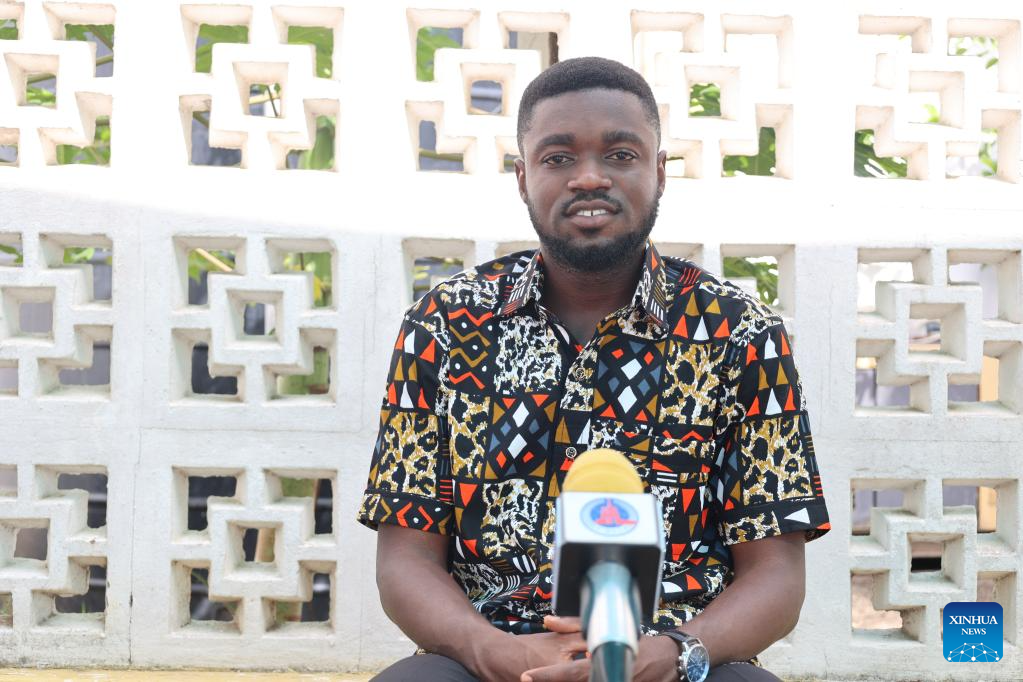Interview: China's economic rebound, technological development will benefit more Africans

Kwaku Amponsah Asiama, the executive and political assistant to the general secretary of Ghana's ruling New Patriotic Party, speaks in an interview in Accra, Ghana, on May 10, 2023. China's rapid economic recovery and technological development will bring more benefits to African people, a Ghanaian politician has said. (Photo by Seth/Xinhua)
ACCRA, May 29 (Xinhua) -- China's rapid economic recovery and technological development will bring more benefits to African people, a Ghanaian politician has said.
Speaking to Xinhua in a recent interview, Kwaku Amponsah Asiama, the executive and political assistant to the general secretary of Ghana's ruling New Patriotic Party, said the viewpoint is anchored in his close observation in China, life and work experiences in Africa, and confidence in the evolving cooperation between the two sides.
In April, Asiama participated in the 7th China-Africa Youth Festival held in China as the sole representative of Ghanaian youths, during which he visited different Chinese cities and projects for the first time and shared his thoughts on China-Africa cooperation with other representatives.
"It was one of the best experiences I've had in my life as an individual. I was quite impressed with everything that I saw in China, and how things have been put in place in China," he said, praising the country for its hospitality, amicable environment, and vibrant economy.
Asiama said he is struck by the splendor of the Great Wall and Mount Taishan, and the scene of tourists at home and abroad now flocking to those well-known tourist attractions, mirroring a boom in China's tourism industry.
According to him, the recovery of the tourism sector bodes well for China's economy as it could fuel growth in many other sectors such as catering, hospitality and transportation.
"I must commend China for this; it is obviously still one of the fastest-growing economies in the world. Things are back on track, and they're moving with a very high speed to make sure that things get to the very normal level," Asiama said.
Describing China's high-speed train as top-notch, Asiama said he was amazed at how Chinese people have leveraged their wisdom and creativity to solve residents' travel problems in the process of urbanization, which also offered a valuable experience to Africa, a continent with huge numbers of people facing various challenges in transportation.
"If you look at the quality of roads being constructed (by Chinese) in most of these African countries, there is no difference from what we see in China," he said, stressing that this trip bolstered his idea that Chinese-built projects always deliver one of the best qualities under the Belt and Road initiative.
As a crop science major, Asiama has always been itching to study China's agricultural technology and how it is being applied to feed a country with a population of 1.4 billion. Finally, the trip allowed him to take a closer look at China's agricultural development.
"China has the machinery, technology, and equipment to be able to cultivate arable crops, vegetables, or fruits in large quantities or on a large scale production," Asiama said, noting that China's advancement in agriculture could benefit African countries like Ghana, which urgently needs to revamp its traditional farming.
"We have the rainy season and the dry season here in Ghana. So once we are out of the rainy season, how could we be able to irrigate our lands? It will need a huge irrigation system and technology to be able to cultivate (the crops)," he said.
Asiama voiced his hope that more agricultural cooperation could be achieved between the two countries to enable more low-income Ghanaian farmers to benefit from the boom in modern technology.
Asiama said the trip also reinforced his idea of being a narrator of Chinese stories in Africa. "I think that the best thing is to talk about it. The more we talk about it, the more people get to know about China."


